【优质文档】2016年自考英语二教材课文讲义unit6
- 格式:pdf
- 大小:421.24 KB
- 文档页数:17
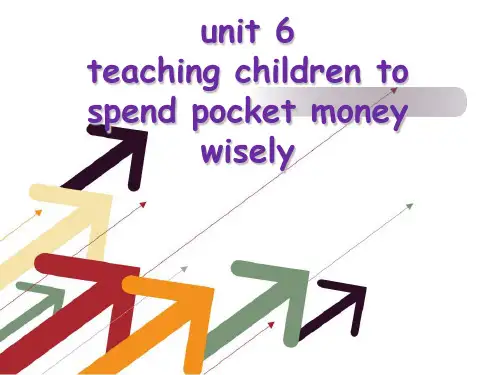

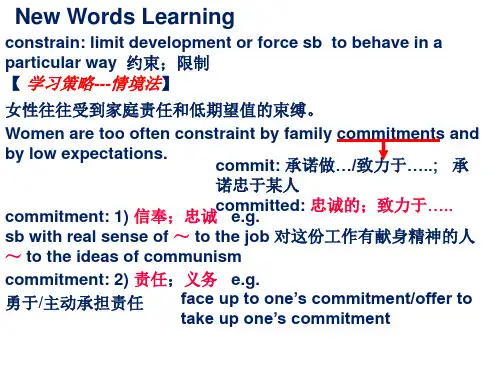
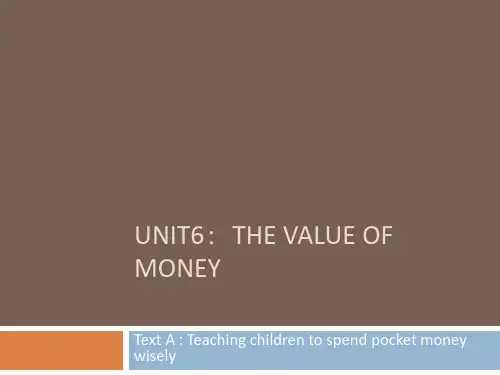
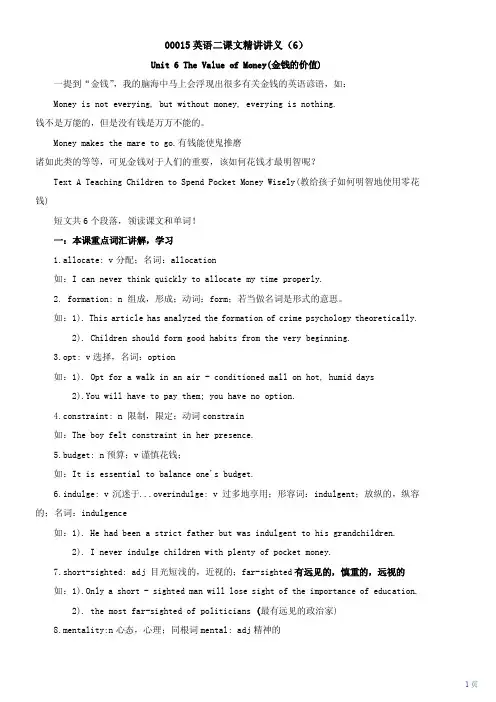
00015英语二课文精讲讲义(6)Unit 6 The Value of Money(金钱的价值)一提到“金钱”,我的脑海中马上会浮现出很多有关金钱的英语谚语,如:Money is not everying, but without money, everying is nothing.钱不是万能的,但是没有钱是万万不能的。
Money makes the mare to go.有钱能使鬼推磨诸如此类的等等,可见金钱对于人们的重要,该如何花钱才最明智呢?Text A Teaching Children to Spend Pocket Money Wisely(教给孩子如何明智地使用零花钱)短文共6个段落,领读课文和单词!一:本课重点词汇讲解,学习1.allocate: v分配;名词:allocation如:I can never think quickly to allocate my time properly.2. formation: n 组成,形成;动词:form;若当做名词是形式的意思。
如:1). This article has analyzed the formation of crime psychology theoretically.2).Children should form good habits from the very beginning.3.opt: v选择,名词:option如:1).Opt for a walk in an air - conditioned mall on hot, humid days2).You will have to pay them; you have no option.4.constraint: n 限制,限定;动词constrain如:The boy felt constraint in her presence.5.budget: n预算;v谨慎花钱;如:It is essential to balance one's budget.6.indulge: v沉迷于...overindulge: v 过多地享用;形容词:indulgent;放纵的,纵容的;名词:indulgence如:1). He had been a strict father but was indulgent to his grandchildren.2). I never indulge children with plenty of pocket money.7.short-sighted: adj 目光短浅的,近视的;far-sighted有远见的,慎重的,远视的如:1).Only a short - sighted man will lose sight of the importance of education.2). the most far-sighted of politicians (最有远见的政治家)8.mentality:n心态,心理;同根词mental: adj精神的如: He has many years' experience of the criminal mentality.(他研究犯罪心理有多年经验)9.rationing:n定量配给;ration v限量供应如:1). We have to ration the water.2).Food rationing was abolished in that country long ago.10.unnecessarily: adv没有必要地;同根词:necessary:adj; unnecessary: adj;如:1). It’s very foolish of the commander to expose his men to unnecessary risks.2). It is necessary for us to drink enough water every day.11.differentiate: v区分(相当于distinguish),同根词:different: adj; difference: n如:1). It’s improper to differentiate between pupils according to their family background.2).Children do not know by instinct the difference between right and wrong.12.resist: v抵挡,名词:resistance,一起学习 temptation: n 诱惑如:1). We anticipate that we will meet a certain amount of resistance to our plan.2). Most girls can’t resist the temptation of chocolates.二.课文重点短语,句子分析、讲解:1. Parents give pocket money to their children in different ways. Some give a lump sum at the beginning of a month or a week. Others prefer to give pocket money on a daily basis.译文:父母以不同的方式给孩子零花钱。

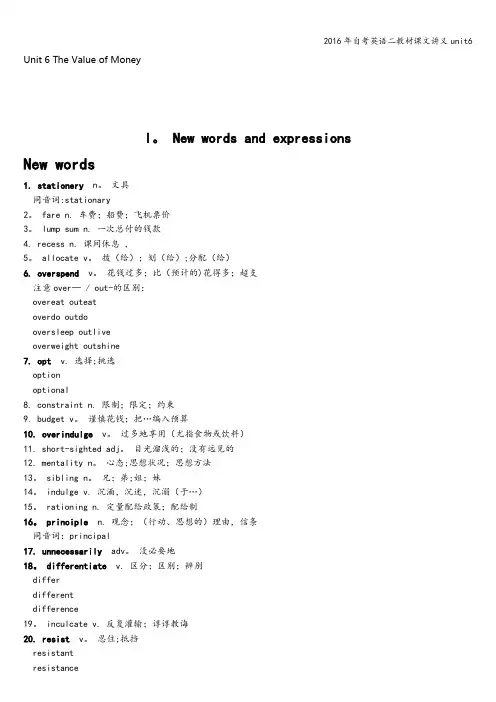
Unit 6 The Value of MoneyI。
New words and expressions New words1. stationery n。
文具同音词:stationary2。
fare n. 车费;船费;飞机票价3。
lump sum n. 一次总付的钱款4. recess n. 课间休息,5。
allocate v。
拨(给);划(给);分配(给)6. overspend v。
花钱过多;比(预计的)花得多;超支注意over— / out-的区别:overeat outeatoverdo outdooversleep outliveoverweight outshine7. opt v. 选择;挑选optionoptional8. constraint n. 限制;限定;约束9. budget v。
谨慎花钱;把…编入预算10. overindulge v。
过多地享用(尤指食物或饮料)11. short-sighted adj。
目光溜浅的;没有远见的12. mentality n。
心态;思想状况;思想方法13。
sibling n。
兄;弟;姐;妹14。
indulge v. 沉湎,沉迷,沉溺(于…)15。
rationing n. 定量配给政策;配给制16。
principle n. 观念;(行动、思想的)理由,信条同音词:principal17. unnecessarily adv。
没必要地18。
differentiate v. 区分;区别;辨别differdifferentdifference19。
inculcate v. 反复灌输;谆谆教诲20. resist v。
忍住;抵挡resistantresistance21。
temptation n。
引诱;诱惑22. scheme n. 计划;方案;体系;体制23。
formation n. 组成;形成24. kindergarten n. 幼儿园25。
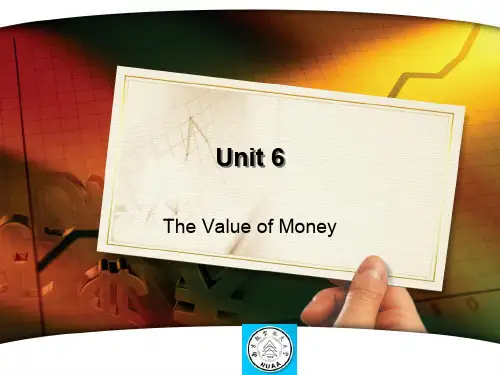
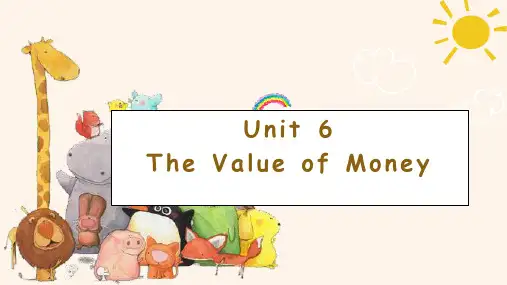
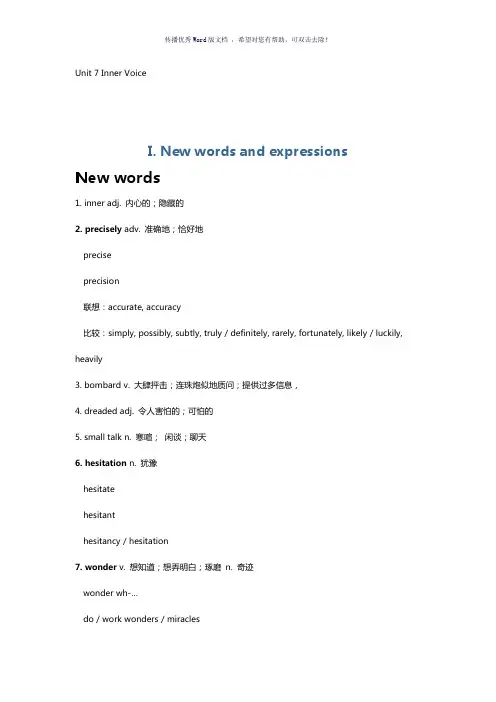
Unit 7 Inner VoiceI. New words and expressionsNew words1. inner adj. 内心的;隐藏的2. precisely adv. 准确地;恰好地preciseprecision联想:accurate, accuracy比较:simply, possibly, subtly, truly / definitely, rarely, fortunately, likely / luckily, heavily3. bombard v. 大肆抨击;连珠炮似地质问;提供过多信息,4. dreaded adj. 令人害怕的;可怕的5. small talk n. 寒喧;闲谈;聊天6. hesitation n. 犹豫hesitatehesitanthesitancy / hesitation7. wonder v. 想知道;想弄明白;琢磨n. 奇迹wonder wh-…do / work wonders / miracles8. prompt v. 促使;导致;激起9. complete adj. (用以强调)完全的,彻底的10. upset adj. 难过的;不高兴的;沮丧的11. roll v. (使)翻滚,滚动12. despite prep. 即使;尽管despite / in spite of that fact that …13. feeble adj. 无效的;无力的14. attempt n./ v. 企图;试图;尝试attempted15. wipe v.(用布、手等)擦干净,抹掉16. profusely adv. 大量地;连连地17. address v. 写(收信人)姓名地址;致函18. receptionist n. 接待员19. attach v. 把…固定,把…附(在…上)attach …to…attached 依恋的;附加的;附属的attachment 依恋;附件20. emotion n. 强烈的感情;情感;情绪emotionalemotionless21. contain v. 控制,克制,抑制(感情)22. apparently adv. 据…所知;看来;显然23. overwhelming adj. 巨大的;压倒性的;无法抗拒的overwhelming problemsan overwhelmed person联想:surprised / surprisingexcited / excitingamazed / amazingdisappointed / disappointingfrightened / frighting注意:excited eyes / expressions / looks24. scream v. 高声喊,大声叫Phrases and Expressions1. be lost in one's thought陷入沉思2. break down 失败3. come up with找到(答案等);想出4. drop…off (顺路)把…放下5. take one's own life自杀6. in desperation 在绝望中;走投无路7. care about sb. 关心;关怀8. take a chance 冒险9. make a difference 有作用;产生影响II. Text LearningYour Inner Voice①(1)My day started just like all the other days for the past 15 years where I get up, make some coffee, shower, get dressed and leave for the train station at precisely 7:35 A.M. to arrive at work by 8:30. While on the train I would always choose a seat away from the crowd so I can read the newspaper in peace and quiet. (2)At work I am always being bombarded with questions from coworkers, suppliers, telephone and then those dreaded meetings, so the last thing I need is some stranger to sit beside me and make small talk.本部分重点及难点:1. My day started just like all the other days for the past 15 years where I get up, make some coffee, shower, get dressed and leave for the train station at precisely 7:35 A.M. to arrive at work by 8:30.(1) where引导定语从句,先行词为days。
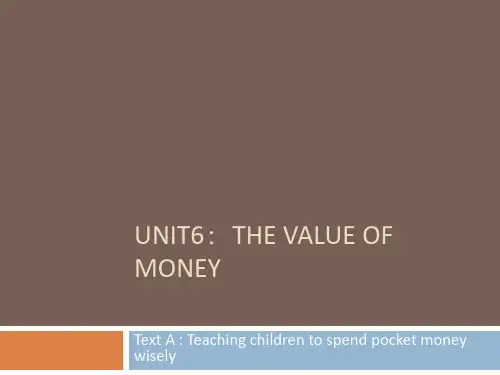
Unit 7T ext AFamilies“Family”_ the word has different meanings f or different people, and even the di ctionary gives us sev eral definitions: “a group of people related by blood or marriage,’’“two adults and their children,’’“ all those people descended f rom a common ancestor,’’“ a household,’’ and so on. Some people think of a family as a mother, a father, and their children; others include grandparents, aunts, uncles, and cousins. For some of us, family means the group of relatives living far away from home. For others, having a family simply means having children. Some f amilies have long histories, while others know very little about their ancestors. No matter if it is young or old, large or small, traditional or modern, every f amily has a sense of what a f amily is. It is that f eeling of belonging, of love and security that comes f rom living together, helping and sharing.There are basically two types of families: nuclear families and extended f amilies. The nuclear family usually consists of two parents (mother and f ather) and thei r children. The mother and f ather f orm the nucleus, or cent er, of the nuclear family. The children stay in the nuclear f amily until they grow up and marry. Then they f orm new nuclear families.The extended f amily is very large. There are of t en many nuclear families in one extended f amily. An extended f amily includes children, parents, grand-parents, uncles, aunts, and cousins. The members of an extended f amily are related by blood (grandparents, parents, children, brothers, sisters, etc.) or by marriage (husbands, wives, mothers-in-law, etc.). They are all related, so the members of an extended f amily are called relatives.Traditionally, all the members of an extended family lived in the same area. However, with the change from an agricultural to an industrial society, many nuclear families moved away from the f amily home in order to f ind work. In industrial societies today, the members of most nuclear families live together, but most extended f amilies do not live together. Theref ore we can say that the nuclear family becomes more important than the extended f amily as the society industrializ es: In post-industrial societies like the United States, even the nuclear f amily is changing. The nuclear family is becoming smaller as parents want f ewer children, and the number of childless families is increasing. Traditionally, the f ather of a nucl ear family earned money f or the family while the mother cared for house and the children. Today, more than 50% of the nuclear f amilies in the United States are two-earner families_ both the f ather and the mother earn money f or the f amily_ and in a f ew families the mother earns the money while the f ather takes care of the house and the children. Many nuclear f amilies are also “splitting up’’ _ more and more parents are getting divorced.What will be the result of this “ splitting”of the nuclear f amily? Social scientists now talk of two new f amily f orms: the single parent f amily and the remarried f amil y. Almost 20% of all American f amilies are single parent f amilies, and in 85% of these f amilies the single parent is the mother.Most single parents f ind it very dif f i cult to take care of a f amily alone, so they soon marry again and f orm remarried f amilies. As social scientists study these two new f amily f orms, they will be able to tell us more about the f uture of the nuclear family in the post-industrial age. (565 words) (3) (23)T ext BThe Changing American FamilyThe f amily is important to people all over the world although the structure of the family is quite different from one count ry to another. In the United States, as in many countries in the world, the f amily is changing. A generation or two ago, the traditional f amily, in which the f ather was boss, was customary. Now the modern f amily, in which both the f ather and the mother are equal partners, is more common. Although there are several similarities between the traditional and the modern f amily, there are also some very important diff erences.The traditional f amily of yesterday and the modern f amily of today have several similarities. The traditional f amily was a nuclear f amily, and the modern f amily is, too. The role of the father in the traditional f amily was to provide f or his f amily. Similarly, the f ather in the modern family is expected to do so, also. The mother in the traditional family took care of the children’s physical and emotional needs just as the modern mother does.On the other hand, there are some great diff erences between the traditional f amily and the modern f amily. The f irst important dif ference is in the man’s role. The traditional husband was the head of the household, because he was the only one who worked outside the home. If the wi f e worked f or pay, then the husband was not considered to be a good provider. In many f amilies today, both husband and wif e work f or pay. Theref ore, they share the role of head of household. In addition, the traditional husband usually made the big decisions about spending money. However, the modern husband shares these decisions with his working wi fe. Also, the traditional husband did not help his wif e with the housework or m eal preparation. Dinner was ready when he cam e home. In contrast, the modern husband helps his working wife at home. He may do some of the household jobs, and it is not unusual f or him to cook.The second diff erence is in the woman’s role. In the traditional f amily, the woman may have worked f or pay during her f irst years of marriage. However, af ter she becam e pregnant, she would usually give up her job. Her primary role was to take care of her family and home. In contrast, in many f amilies today, the modern woman works outside the home even af ter she has children. She’s doing two jobs instead of one, so she is busier than the traditional mother was. The traditional wif e learned to live within her husband’s income. On the other hand, the modern wif e does not have to because the f amily has two incomes.The f inal difference is in the role of the children. In the traditional f amily, the children were taken care of by the mother because she did not work outside the home. However, today preschool children may go to a child care center or to a baby-sitter regularly because the mother works. The school-age children of a traditional f amily were more dependent. Their mother was there to help them to get ready f or school and to make their breakfast. In contrast, modern children are more independent. They have to get up early in the morning and get ready f or school. Their mother is busy getting ready f or work, so they may even have to make their own breakfast.In conclusion, the American family of today is diff erent f rom the f amily of f i f ty years ago. In the modern f amily, the roles of the f ather, mother, and children have changed as more and more women work outside the home. The next century may bring more important changes to the American f amily structure. In should be interesting to see.(614 words) (6)(17)。
英语(二)全国高等教育自学考试主讲人:席艺涵n普洱(P u'e r)茶深受中国人喜爱,最好的普洱茶产自云南的西戏版纳(Xishuangbanna),那里的气候和环境为普洱茶树的生长提供了最佳条件。
普洱茶颜色较深,味道与其他的茶截然不同。
普洱茶泡(brew)的时间越长越有味道。
许多爱吗的人尤其喜欢其独特的香味和口感。
普洱茶含有多种有益健康的元素,常饮普洱茶有助子保护心脏和血管,还有减肥、消除疲劳和促进消化的功效。
n Pu'er tea enjoys great popularity among Chinese people, and the best Pu'er tea is produced in Xishuanebanna, Yunnan Province, where the climate and environment provide the best condition for the tea tree to grow. The color of Pu'er is relatively deep and its flavor is totally different from others. The longer it brews, the better it tastes. Many people who love the tea are especially fond of its unique flavor and taste. Considering that Pu'er contains a great number of elements that are beneficial to health, drinking the tea regularly helps protect the heart and blood vessels, as well as lose weight, eliminate fatigue and promote digestion.The Value of Money12Sample dialoguePair practice analysis对话译文:史蒂夫:澳大利亚英语和英国英语很相似,你同意吗?爱丽丝:我不确定是否十分赞成。
Unit 6 The Value of Money
I. New words and expressions New words
1. stationery n.文具
同音词: stationary
2.fare n. 车费;船费;飞机票价
3.lump sum n.一次总付的钱款
4.recess n. 课间休息,
5.allocate v. 拨(给);划(给);分配(给)
6.overspendv. 花钱过多;比(预计的)花得多;超支
注意 over- / out-的区别:
overeat outeat
overdo outdo
oversleep outlive
overweight outshine
7.opt v. 选择;挑选
option
optional
8.constraint n.限制;限定;约束
9.budget v.谨慎花钱;把?编入预算
10. overindulge v.过多地享用(尤指食物或饮料)
11. short-sighted adj.目光溜浅的;没有远见的
12.mentality n.心态;思想状况;思想方法
13.sibling n.兄;弟;姐;妹
14.indulge v.沉湎,沉迷,沉溺(于?)
15.rationing n.定量配给政策;配给制
16.principle n. 观念;(行动、思想的)理由,信条同音
词: principal
17. unnecessarily adv.没必要地
18. differentiate v.区分;区别;辨别
differ
different
difference
19.inculcate v.反复灌输;谆谆教诲
20.resist v. 忍住;抵挡
resistant
resistance
21. temptation n.引诱;诱惑
22.scheme n.计划;方案;体系;体制
23.formation n.组成;形成
24. kindergarten n.幼儿园
25. monthly adj.按月结算的;有效期为一个月的。